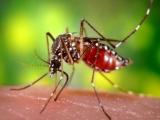Scientists today reported that a messenger RNA (mRNA)-based Zika vaccine induced strong and durable protection in animals with a single dose, the first to show that level of protection without using a live virus.
Post-vaccine antibodies stay high
The vaccine contains mRNA coding two key proteins from a Zika virus isolated in a 2013 outbreak. A team from the University of Pennsylvania, Duke University, and the National Institutes of Health reported its findings today in Nature.
Mice and monkeys injected with a single dose of the vaccine developed rapid and strong protection: mice 2 weeks later and macaques 5 weeks later. Mice still showed protection 5 months after vaccination. For both sets of animals, antibody levels peaked after several weeks and remained high, which researchers said is the result of strong stimulation of CD4 helper T cells.
The group said the mRNA approach may have advantages over other candidate Zika vaccines. For example, those containing live or attenuated viruses would likely be contraindicated in those with weakened immune systems, and modified adenovirus-based approaches might prompt an immune response that neutralizes the viruses before they deliver their protective Zika proteins.
Drew Weissman, MD, PhD, in a University of Pennsylvania School of Medicine press release, said the strategy is promising. "Our work so far suggests that this new vaccine strategy induces a level of virus neutralization about 25 times greater, after a single dose, than one sees in standard vaccines."
The team hopes to start clinical trials in 12 to 18 months. Weissman said if the vaccine is effective in humans after a single dose, the mRNA approach would offer other advantages, such as streamlined administration. Also, Weisman said production of an mRNA vaccine would probably be easier and less expensive than live-virus or DNA-based vaccines.
Another candidate mRNA vaccine entered phase 1 clinical trials last month with $54.4 million in support from the Department of Health and Human Services Biomedical Advances Research and Development Authority (BARDA). There are about 40 Zika virus vaccines in the development pipeline.
Zika reflections, new cases
- Feb 1 marked 1 year since the World Health Organization (WHO) declared that Zika virus and its complications are a public health emergency of international concern. In a commentary today, WHO Director-General Margaret Chan, MD, MPH, said though the outbreak exposed preparedness problems such as poor access to family planning and dismantled mosquito control programs, over the past year surveillance has improved as the virus continues to spread. With Zika entrenched in many countries and with little prospect of a licensed vaccine by 2020, challenges remain for the WHO, countries, and researchers, despite the November 2016 lifting of the health emergency." We are now in the long haul and we are all in this together," Chan wrote.
- In its Zika virus update today, the US Centers for Disease Control and Prevention (CDC) said one more baby has been born in the United States with Zika-related birth defects, raising the total to 38. The number of Zika-linked pregnancy losses remained at 5. So far 999 women in the US Zika pregnancy registry have completed their pregnancies with or without birth defects. There are 1,394 women in US states in the CDC Zika pregnancy registry.
- The Florida Department of Health (Florida Health) on Jan 27 reported three more locally acquired Zika cases. Two involve patients who were sampled in October and whose results were just confirmed by the CDC. The third patient has an asymptomatic infection, but a blood sample taken on Dec 21 revealed active infection. Two are Miami-Dade County residents, and the other is an out-of-state resident. The state now has 262 local infections. Florida Health also reported two new cases in which patient exposure can't be determined.
See also:
Feb 2 Nature abstract
Feb 2 University of Pennsylvania press release
Jan 10 CIDRAP News story "Zika mRNA vaccine enters clinical trial; Angola reports cases"
Feb 2 CDC Zika update
Jan 27 Florida Health statement
Feb 2 Margaret Chan commentary





















